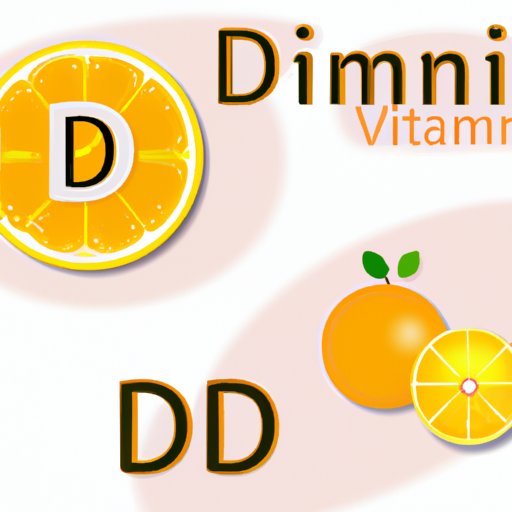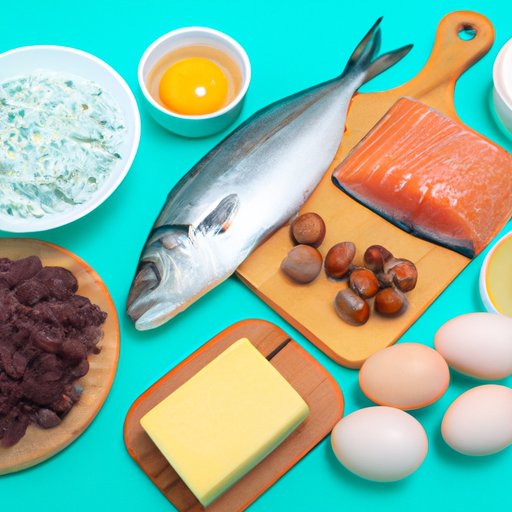
Introduction
Vitamin D, also known as the sunshine vitamin, is an essential nutrient that plays a crucial role in maintaining bone health and immune function. It is synthesized in our skin in response to sunlight, but it can also be obtained through diet and supplements. However, taking vitamin D with or without food can affect its absorption in the body. In this article, we will explore the science behind whether vitamin D should be taken with food and the best practices for maximizing its benefits.
The Importance of Vitamin D with Meals: A Comprehensive Guide
Food plays a critical role in the absorption of vitamin D. Vitamin D is a fat-soluble vitamin, which means it needs dietary fat to be absorbed properly in the body. When taken without food, the absorption of vitamin D may be significantly lower, resulting in a decreased level of its benefits. Studies have shown that taking vitamin D with meals can increase its absorption by up to 50%.
Furthermore, taking vitamin D without food can lead to an upset stomach and other digestive issues, as it is a fat-soluble vitamin that can be harsh on an empty stomach. Whereas taking the vitamin with food can help to reduce these symptoms and make it easier for the body to absorb the nutrient.

Foods That Help Boost Vitamin D Absorption: What You Need to Know
While vitamin D can be obtained through supplements, it is also found in some foods. Fatty fish, such as salmon and tuna, egg yolks, cheese, and mushrooms, are great sources of vitamin D. However, certain foods are also rich in compounds that increase vitamin D absorption, such as those high in calcium, phosphorus and magnesium.
Examples of such foods include dairy products, leafy greens, seeds, and nuts. Combining vitamin D-rich foods with those rich in these compounds can aid in its absorption and increase the levels of this essential nutrient in the body.
The Pros and Cons of Taking Vitamin D Supplements with Food
Vitamin D supplements are a popular option for those who are unable to get adequate sunlight exposure or have low levels of vitamin D in their body. However, taking vitamin D supplements with food has both advantages and disadvantages.
The benefits of taking vitamin D supplements with food are that it can help increase its absorption in the body and reduce stomach upset. However, taking vitamin D supplements with food may also slow down the absorption process, which could cause its effectiveness to be delayed slightly.
It is recommended to take vitamin D supplements with a meal that contains some fat, such as avocado, nuts, or fish. This can help vitamin D be absorbed and utilized in the body more efficiently.
Vitamin D: Is It Better to Take It with Your Breakfast or Dinner?
Timing is also an important factor when taking vitamin D supplements with food. Research suggests it is best to take vitamin D with your largest meal of the day as the increased fat in larger meals increases the body’s ability to absorb the vitamin D. Specifically, research suggests that taking vitamin D with breakfast may be the best option, as our bodies tend to absorb this nutrient more efficiently in the morning.
However, taking vitamin D with dinner may also have its benefits, such as helping to promote sleep and relaxation, which can aid in immune function and overall physical well-being.
Maximizing Vitamin D Benefits by Combining with the Right Foods
While taking vitamin D supplements can be a quick fix for low vitamin D levels, it’s important to remember that good nutrition practices can also play a significant role in maximizing vitamin D benefits.
Vitamins, minerals, and foods that enhance vitamin D absorption include magnesium, calcium, vitamin K2, and zinc. Foods high in these nutrients include leafy greens, nuts, seeds, fortified cereals, and lean meats. Additionally, following a balanced diet containing a variety of whole foods can not only boost vitamin D benefits but also provide other essential nutrients for overall health.
Vitamin D Absorption: How Food Can Increase or Decrease Bioavailability
Several factors can affect the bioavailability of vitamin D in the body, including food choices. For example, a diet low in dietary fat may limit the body’s ability to absorb vitamin D. On the other hand, consuming caffeine and alcohol can decrease vitamin D absorption rates by making it harder for the body to absorb the nutrient efficiently.
The Link Between Vitamin D and Food: Understanding the Science Behind Optimal Nutrition
Research suggests that consuming vitamin D with food can increase its bioavailability in the body, leading to enhanced physical and mental well-being. By combining vitamin D-rich foods with those that are high in compounds that increase vitamin D absorption, we can optimize our daily dietary intake of this essential nutrient.
Conclusion
Vitamin D is an essential nutrient that plays a crucial role in overall health. While supplementation can be useful in treating vitamin D deficiencies, following a balanced diet and taking vitamin D with meals can help to maximize its benefits. By combining vitamin D-rich foods with those that are high in compounds that increase its absorption, and consuming vitamin D with dietary fat, you can optimize your daily dietary intake of this essential nutrient and maintain good health.
For further reading on vitamin D and the role of nutrition, consult a trusted healthcare provider or registered dietician.




